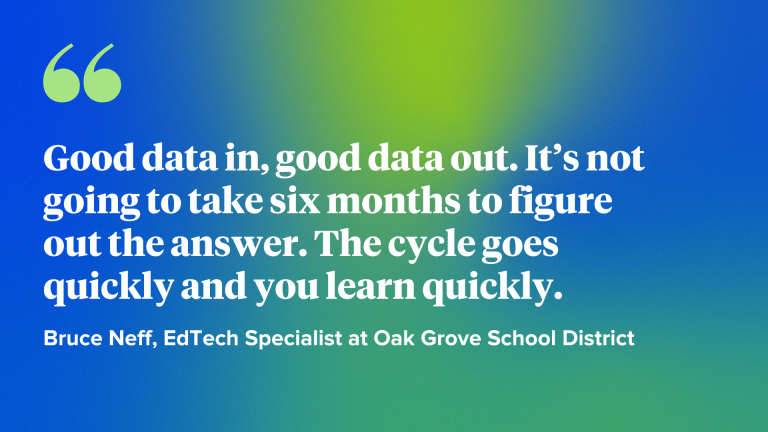
Every day, district administrators research, vet, budget for, and procure digital learning resources for their students and teachers. Over the past few years, with education technology use becoming more pervasive, answering the question of what’s working has become critical.
During a recent webinar, K-12 administrators Bruce Neff, EdTech Specialist at Oak Grove School District in California, and Wade Buchs, Curriculum Integration Specialist at School City of Mishawaka in Indiana, discussed how they use evidence to inform, implement, and improve their edtech decisions and budgets.
The panelists shared their experiences in edtech, including insights on how using an edtech effectiveness system has impacted their work. Buchs regularly supports and reviews teachers' use of curriculum products and other edtech, and also digs into student interactions with various tools.
One rapid-cycle evaluation (RCE) revealed that the fidelity of edtech usage did not meet expectations, leading Buchs’ team to dig even deeper with more RCEs and more questions. Subsequent analyses will help the district correlate usage with outcomes, pushing them to continue paying for and implementing products that positively impact students and teachers.
“LearnPlatform’s IMPACT™ tool helps us dive into research and see what is making a difference and what is not. LearnPlatform has been housing all of our data and rapid-cycle evaluations – we’re able to see consistencies not just among cohorts, but among grade levels for online tools and edtech,” Buchs said.
Neff’s experience, on the other hand, started with a focus on student data privacy – he later built on his organization’s use of LearnPlatform and saw the value of rapid-cycle evaluation for his district’s edtech tools.
His team’s first analysis looked at two high-value products: a district-wide purchase and a site-based purchase. The RCE revealed lower levels of fidelity of usage than expected for the district-supported tool – this caused Neff’s team to take action and pull together evidence to present to key stakeholders as they discussed budgets.
“I had a big ‘aha’ moment. The students weren’t using the tool at the required moments, which is something I can bring up in meetings at the district level,” Neff said.
According to Neff, this is the first time he’s been able to share research-backed data to other key stakeholders, like those making budget decisions, about a product’s effectiveness. Prior to implementing an edtech effectiveness system, Neff said that evaluations of edtech tools were primarily done by word of mouth, focusing on opinion rather than data. The evidence gathered with rapid-cycle evaluations is specific to his district’s needs, and can be paired with qualitative teacher feedback.
Both Buchs and Neff said their backgrounds in mathematics allow them to navigate data, but that it is often challenging to compile and organize it into something usable. Finding a way to organize and take action with data allows district leaders to dig deeper and figure out how it works for their local contexts.
“Good data in, good data out. It’s not going to take six months to figure out the answer. The cycle goes quickly and you learn quickly,” Neff said.
The leaders said they’ve gained confidence in being able to run rapid edtech evaluations, present evidence to key stakeholders and make informed decisions about their districts. Watch the webinar to learn more.
Related Content
 columbus_city_schools_1.png
columbus_city_schools_1.pngBlog Articles
 ilearnnh_thumbnail.png
ilearnnh_thumbnail.pngBlog Articles
![We can see their usage, but we want to know [which education tools] teachers feel are helpful in their environment.](/sites/default/files/styles/medium/public/image/2023-06/User%20Group%20Recap.png?itok=_3svfNBb) User Group Recap.png
User Group Recap.pngBlog Articles